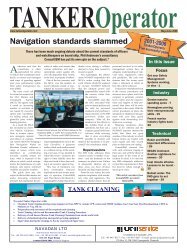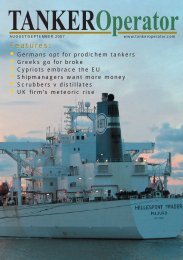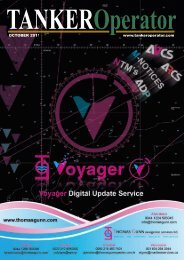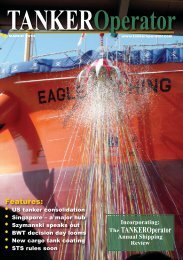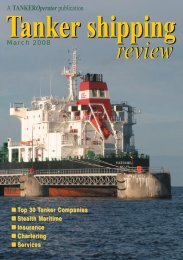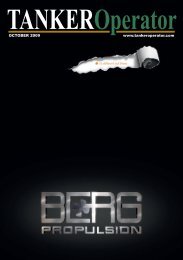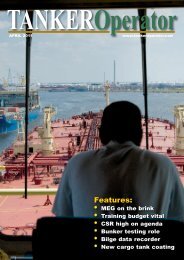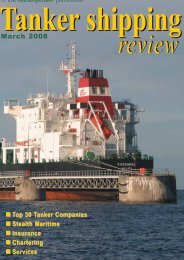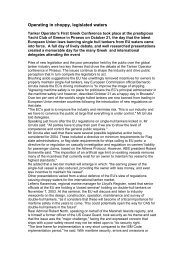Features: - Tanker Operator
Features: - Tanker Operator
Features: - Tanker Operator
Create successful ePaper yourself
Turn your PDF publications into a flip-book with our unique Google optimized e-Paper software.
TECHNOLOGY - TRAINING SYSTEMS<br />
Warsash has embraced Intertanko’s<br />
voluntary <strong>Tanker</strong> Officers Training Standard<br />
(TOTS) scheme unveiled in April, 2008.<br />
Earlier this year, Intertanko introduced<br />
ETOTS, the electronic training version of<br />
TOTS, which has gained Nautical Institute<br />
and IMAREST approval.<br />
ETOTS was launched in association but not<br />
exclusively with Norwegian software house<br />
Seagull.<br />
TOTS introduced<br />
The initiative was introduced for several<br />
reasons, not least due to the increase in<br />
accidents on board tankers and officer training<br />
requirements connected to the continuous<br />
improvements as laid down in TMSA2.<br />
Howard Snaith, Intertanko’s director marine<br />
and chemicals, speaking at the seminar<br />
organised by Warsash, said that the human<br />
factor, which is heavily allied to the shortage of<br />
experienced officers, could explain the increase<br />
in incidents added to the fact that there is more<br />
transparency today than a few years ago.<br />
He also said that the shipping industry did<br />
not know why this was happening but that an<br />
inter-industry working group was analysing<br />
some 35 fires and explosions on small chemical<br />
and product tankers over the past 25 years.<br />
Snaith said that the working group had<br />
come to the conclusion that procedures on<br />
board were not being followed. “They weren’t<br />
complying with what they were trained for –<br />
the human element aspect,” he said.<br />
The group looked at the aviation industry<br />
and in particular at the CAA, which had<br />
designed the human element out of the cockpit<br />
thus the human interface had become more of<br />
a monitoring operation. However, humans in<br />
general are not good at this, so accidents<br />
increased, the group found.<br />
The birth of bridge resource management<br />
led to TOTS including a crew resource<br />
management element in the standard. The<br />
objective was to ease compliance by<br />
demonstrating that the officer had undertaken<br />
competent training and to ease candidates<br />
into the system before they would normally<br />
be accepted.<br />
The human factor element that the industry<br />
is trying to introduce is a training system that<br />
engenders the “….not only knows and<br />
understands, but realises the consequences of<br />
not doing it (the task),” Snaith said.<br />
At the STCW revision discussions, the IMO<br />
is trying to harmonise seafarer endorsements<br />
for handling dangerous cargoes, as some flag<br />
administrations have different interpretations<br />
of the sea time required for the endorsements.<br />
Raising the bar<br />
By and large the IMO introduces the<br />
minimum acceptable standard requirements<br />
but TOTS raises the bar to what oil companies<br />
are looking for when vetting a possible<br />
tanker’s crew for a charter, Snaith claimed.<br />
ETOTS licenses are issued as an alternative<br />
to the paper version and Seagull’s<br />
involvement is on a non-exclusive basis,<br />
Snaith explained. A company’s HR manager<br />
can monitor progress. As for its<br />
implementation, he said that all IACS<br />
members were authorised to undertake two<br />
sets of audits – on tanker companies’<br />
compliance certificates and on audit centres.<br />
Snaith said that thus far, both the maritime<br />
colleges and companies were now being<br />
audited and that around 40% of Intertanko<br />
members have implemented, or are in the<br />
process of implementing, the scheme, or<br />
its equivalent.<br />
TO<br />
MPRI’S LIQUID CARGO HANDLING SIMULATOR<br />
THE RISKS ARE SIMULATED. THE BENEFITS ARE REAL.<br />
<br />
<br />
<br />
For details, contact Ray Gillett at rgillett@L3mpri-uk.com or call +44 7764 654667.<br />
GOVERNMENT SERVICES > AM&M > SPECIALIZED PRODUCTS > C 3 ISR<br />
<br />
This material is MPRI general capabilities information and does not contain any controlled technical data as defined within the International Traffic in Arms Regulations (ITAR) or Export Administration Regulations (EAR).<br />
52<br />
TANKER<strong>Operator</strong> November/December 2009



